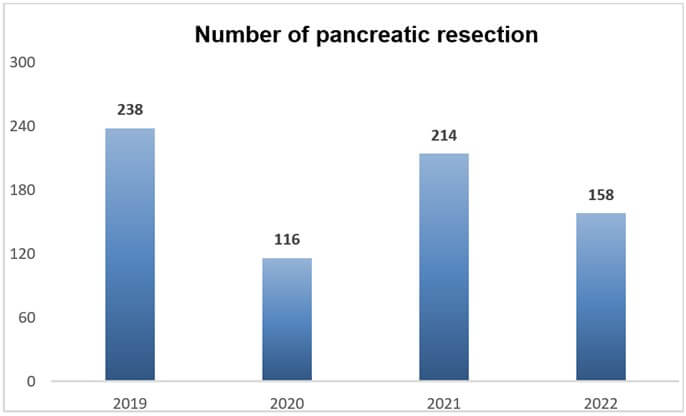Received: Thu 22, Jun 2023
Accepted: Thu 13, Jul 2023
Abstract
Background: To evaluate the impact of the Russian invasion in Ukraine on the treatment of patients with pancreatic cancer. Materials and Methods: We analyzed the providing of surgical treatment of patients with pancreatic cancer in the Shalimov National Institute of Surgery and Transplantology for the different periods before war and during war time since February 24, 2022 till December 31, 2022. Results: The number of pancreatic resections in patients with pancreatic cancer decreased from 238 to 158 per year with the beginning of war. Conclusion: Russia’s invasion of Ukraine damaged healthcare infrastructure. Taking into account the fact that the number of patients with pancreatic cancer in our country increase over year, many patients with pancreatic cancer were left without help in 2022. Thanks to the support of the US, Europe and the world we were able to continue providing surgical treatment of patients with pancreatic cancer. If there is someone who is always ready to come to the rescue then it’s possible to face even the greatest difficulties and the cruelest enemy.
Keywords
Pancreatic cancer, pancreaticoduodenectomy, war, Ukraine
1. Introduction
The life of every Ukrainian changed in a moment, at 3.40 am on February 24, 2022. At that moment, the war with Russia began, in which it was impossible to believe. Later, its cruelty and consequences would be compared to the second world war. This war destroyed the life of every Ukrainian in one way or another. Thousands of civilians died, some people lost their loved ones, others lost their homes and many others left the country in despair and it is not known if they will return home. Some have stayed and live each day to the sound of sirens, warning of deadly missile attacks. About 7 million people have been forced to leave their homes and temporarily move to other, safer regions of our country and more than 5 million refugees, mostly women and children, have fled Ukraine [1].
Russia's large-scale and brutal invasion of Ukraine led to a mass exodus of people from the attacked border areas. There were no evacuation corridors from many attacked and occupied territories, which were captured by the enemy without the right of local residents to leave the territory under enemy control. Many people, including small children, were killed by Russian soldiers during their attempts to leave those territories, and people in the occupied territories were left without means of livelihood and medical care.
In addition to all this, the war also had tragic consequences on the healthcare system. Many hospitals in the occupied territories were destroyed [2], the oncology centers in Mariupol and Kharkiv were completely ruined, a large amount of medical documentation was lost and many health workers immediately went to the front. After the beginning of the war, we also faced the following problems: all logistical links were destroyed, we did not have enough medicines because their delivery was suspended and reserves were quickly depleted and many patients could not reach the hospitals.
Currently, more than 200 medical facilities along the line of contact or in Russian-controlled territories [3-5] are in operation, and the frontline clinics, regional clinics, as well as all clinics in our capital city, were intended to treat the wounded. This has had a serious impact on all oncological diseases: most patients with cancer were left alone with their problems, a large number of them were cut off from their doctors, many lost all their medical records and left without any medical care.
In Ukraine, with a population of around 44 million, there are more than 1.3 million cancer patients. Approximately 160,000 new cases of cancer are diagnosed each year [4]. Among all cancer diseases, pancreatic cancer is a very aggressive cancer with a low 5-year survival rate.
2. Material and Methods
The number of pancreatic cancer patients in our country is increasing over time: according to the National Cancer Registry of Ukraine, in 2016, 4314 new cases of pancreatic cancer were registered, or 11.9 per 100000 population, and 3549 patients died, while in 2019, 4527 cases were diagnosed, or 12.7 per 100000 population, with 3430 deaths [5-8]. Prolonging the lives of these patients is an urgent issue. One of the opportunities to improve the immediate and long-term outcomes of patients with pancreatic cancer is early diagnosis, but the problem of early diagnosis of pancreatic malignancies is extremely urgent.
Even in peacetime, only 25 per cent of patients at the time of admission had a local tumor and underwent surgery; the war exacerbated the problem of late diagnosis of pancreatic tumors, as patients could not get to the doctor in time and be examined. Moreover, since the war, all cancer prevention measures and screening programs have been suspended; all this contributes to an increased incidence of pancreatic cancer in the future. Almost all Ukrainians faced financial difficulties during the war, and the lack of funds is often the cause of the inability to provide even standard treatment, let alone expensive chemotherapy.
Our institute is a leading national institution in the treatment of pancreatic tumors and other pancreatic diseases. Our institute was founded by O.O. Shalimov on 30 May 1972 and today is the Shalimov National Institute of Surgery and Transplantology. The institute consists of 8 surgical departments. We have been treating patients with pancreatic cancer and other pancreatic diseases since 1972. O.O. Shalimov was the first to perform pancreatoduodenectomy (PD) and other pancreas surgeries in Ukraine and the territory of the former Soviet Union. Currently, more than 7,000 complex, reconstructive and high-tech surgeries are performed in the Institute’s clinic each year, and consultative and diagnostic care is provided in the polyclinic to almost 25,000 Ukrainian citizens.
3. Results
In 2019, we performed 238 pancreatic resections in pancreatic cancer patients: 177 PD, 56 distal pancreatectomy (DP) and 5 total pancreatectomy (TP). Due to the Covid-19 pandemic, the number of surgeries decreased significantly and in 2020 we performed 116 pancreatic resections in pancreatic cancer patients: 91 PD, 23 DP and 2 TP. In 2021, we had similar numbers to the pre-Covid era with 214 pancreatic resections: 159 PD, 53 DP and 2 TP. With the advent of war, in 2022 we performed only 158 pancreatic resections: 116 PD and 42 DP. Changes overtime are shown in (Figure 1).

From February to April 2022, surgical activity in our institute was suspended for scheduled patients. During the first few months, the doctors were constantly at work, they did not leave the medical facility at all due to the battles near Kiev, the bombing and missile attacks, and in the ward, we only provided care for the wounded and those patients who had been operated on in the pre-war period and remained in the hospital. We were constantly waiting for the wounded, the air-raid siren sounded up to 8-10 times a night and every night we evacuated our patients to the air-raid shelter inside the hospital, while the seriously ill patients were constantly there.
4. Discussion
This medical collapse was stopped thanks to the solidarity of health workers from Ukraine, US, Europe and the world. Brothers in spirit immediately lent us a hand, and with the help of our colleagues from Europe and elsewhere in the world, we obtained supplies and were able to restore surgery and provide highly specialized care to the wounded. At the beginning of the war, we had patients with pancreatic cancer waiting to be operated on. We did not know how events would unfold, so planned operations were cancelled. But the cancer would not wait for the end of the war and was as aggressive as our enemy. So, the only solution was to ask our foreign colleagues for help.
I would like to express my deep gratitude to the Pancreas Institute in Verona and the Department of Visceral, Vascular and Endocrine Surgery at the University Hospital in Halle who helped us out and to all the doctors involved for operating and treating our pancreatic cancer patients absolutely free of charge. Two months after the start of hostilities, the situation changed for the better, when the Russian Federation troops were pushed back and removed from Kyiv and the Kyiv region, and thanks to the extraordinary support from almost all over the world, since April 2022, in parallel with the treatment of the severely wounded, we have started to provide care for scheduled patients. From April to December, we were able to perform 134 operations and our institute has restored the provision of a full range of medical care to pancreatic cancer patients: currently, we conduct neoadjuvant and adjuvant chemotherapy in pancreatic cancer patients.
5. Conclusion
In spite of the Russian Federation's inhuman crimes against humanity, the killing of hundreds of thousands of our citizens, the extreme cruelty and merciless slaughter of Ukrainians, in spite of the outright genocide of the Ukrainian people in the 21st century, we have resisted for a year. Our spirit is unbreakable. We believe in our victory. Our experience tells us that war is terrible, but if there is someone who is always ready to come to the rescue, then it is possible to face even the greatest difficulties and the cruelest enemy.
Acknowledgements
I want to thank the Armed Forces of Ukraine for the fact that we can work and for the opportunity to write this article.
Ethical Approval
Approval was obtained from the ethics committee of Shalimov National Institute of Surgery and Transplantology. The procedures used in this study adhere to the tenets of the Declaration of Helsinki.
Conflicts of Interest
None.
Consent to Participate
Informed consent was obtained from all individual participants included in the study.
REFERENCES
[1] Peter McIntyre “The war in Ukraine
and cancer patients: Early experiences from the frontline.” ecancer, 2022.
View at: Publisher
Site
[2] Kate Tsurkan “Cancer in a time of
war: the Kyiv oncologists dispensing refuge and hope.” The Guardian,
2022. View at: Publisher
Site
[3] Jo Cavallo “Update on the Impact of
the Russian Invasion of Ukraine on Patients With Cancer A Conversation With
Andriy Hrynkiv, MD.” The ASCO Post, 2022. View at: Publisher
Site
[4] Sergey Kozhukhov, Nataliia Dovganych,
Ivan Smolanka, et al. (2022) “Cancer and War in Ukraine: How the World Can Help
Win This Battle.” JACC CardioOncol, vol. 4, no. 2, pp. 279-282, 2022. View at: Publisher Site | PubMed
[5] The
Lancet Oncology “Conflict
in Ukraine and its impact on cancer care.” Lancet Oncol, vol. 23, no. 4, pp. 439, 2022. View at: Publisher
Site | PubMed
[6] Fedorenko Zoja P, Michailovich Youriy Yo, Goulak Lyudmyla O, et al “CANCER IN
UKRAINE 2016 - 2017 Incidence, mortality, activities of the oncological service
Bulletin of National Cancer Registry of Ukraine.” NCRU, vol. 19, pp. 30-31, 2018. View at: Publisher
Site
[7] Fedorenko Z, Michailovich Yu, Goulak
L, et al “CANCER IN UKRAINE 2018 - 2019 Incidence, mortality, activities of
oncological service Bulletin of National Cancer Registry of Ukraine.” NCRU, vol. 21, pp. 30-31, 2020. View at: Publisher
Site
[8] Fedorenko
Z, Michailovich You, Goulak L, et al “CANCER
IN UKRAINE 2019 - 2020: Incidence, mortality, prevalence and other relevant
statistics Bulletin of the National Cancer Registry of Ukraine.” NCRU,
vol. 22, pp. 30-31, 2021. View
at: Publisher Site
